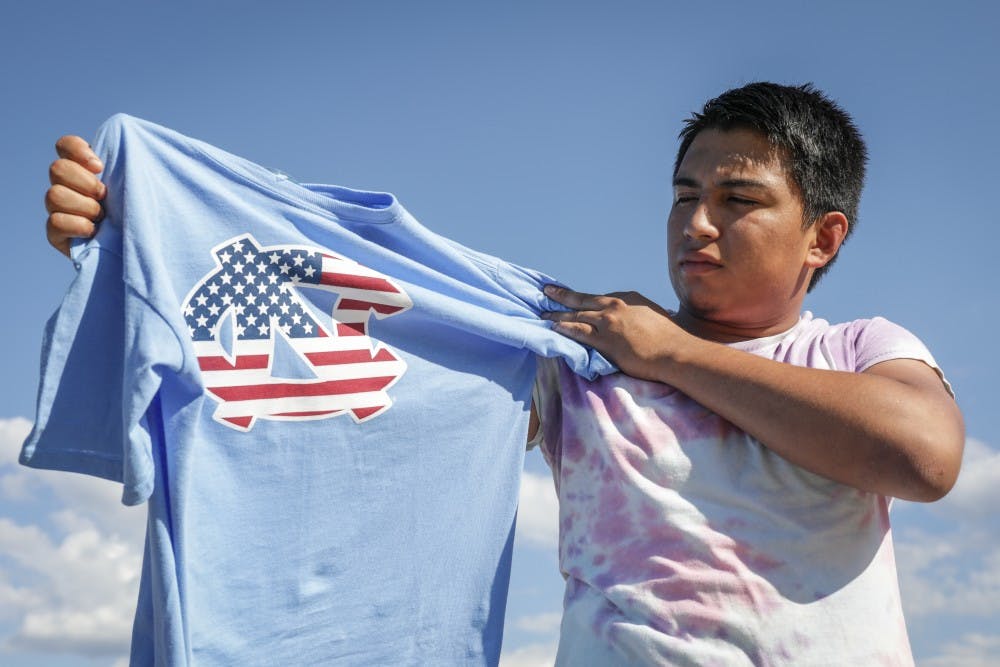What is DACA?
DACA is an executive order by President Barack Obama on June 15, 2012. Under DACA, eligible immigrants can receive a work permit and are protected from deportation for two years, subject to renewal.
Immigration attorney Chris Barnes said a person can be approved for work authorization upon proving their necessity to work in the United States.
While protection under DACA is renewable, the executive action can be removed at anytime.
“It's revocable anytime by the president of the United States, because it’s an executive order, not a law,” Barnes said.
Olvera said having DACA has played a major role in his everyday life. Without the policy, he said he wouldn’t have been able to get a job.
“I worked with this non-profit with kids which I absolutely loved," he said. "Then I got my driver’s license through DACA so I could drive through Charlotte."
What were the requirements to be protected by DACA?
To qualify for DACA, applicants have to complete two applications: one specifically for DACA and another for work authorization.
Applicants have to prove they entered the U.S. before their 16th birthday and were born on or after June 15, 1981. Applicants must also prove their continuous presence in the country from June 15, 2007 to the day they apply, and that they were physically present on June 15, 2012, when the President announced the executive order.
Barnes said applicants must either be a student or graduate, have their GED or currently taking GED or literacy courses.
It's not open to everyone. Certain crimes disqualify applicants from DACA, like driving while impaired, domestic violence and possessing a firearm.
To get the day's news and headlines in your inbox each morning, sign up for our email newsletters.
What does DACA allow recipients to do?
Recipients can get a social security number, authorization to work in the United States and a driver’s license. Barnes said because of DACA, many of his clients have businesses and own property.
“Many jobs, just simply won’t, you won’t qualify unless you have work authorization,” Barnes said. “It opens those doors."
DACA recipients can also apply for advanced parole, allowing them to briefly travel outside of the U.S. with the promise that they will be allowed to reenter.
“A lot of the DACA recipients now have children, and the DACA recipients are taking their children to meet their grandparents and the great grandparents," Barnes said. “DACA recipients are seeing their grandparents, some of them for the first time they can even remember because they were brought here so young.”
Angela Stuesse, assistant professor of anthropology, did research on undocumented communities for 20 years. Stuesse said prior to DACA, there was little incentive to attend college, because undocumented students knew they wouldn’t be able to work in the U.S.
“DACA’s importance can’t be understated in the way it allowed people to dream and to follow those dreams," Stuesse said. "Through getting drivers licenses, qualifying for health insurance, qualifying for loans, like student loans so they could afford to go to school, and then being able to work in their selected fields once they finish.”
How is DACA affecting UNC?
Following Trump’s announcement, the University released a statement regarding undocumented students, saying the change in policy opposed Carolina's values.
“While we are uncertain about the effects of yesterday’s decision, we remain fully committed to welcoming and supporting students enrolled in this program,” the statement said.
The statement also said students' immigration status is protected under the Family Educational Rights and Privacy Act (FERPA), and the University will not share the information.
Gaby Alemán, co-president of the Carolina Hispanic Association , said the statement was vague and doesn’t show a commitment to students, but a commitment to bureaucracy.
“[UNC] is here to create these opportunities, to be this place where we can grow and learn," Alemán said. "Getting rid of DACA directly influences that and has an impact on that. It would be nice to see the University just speak out more about it and to be more firm in its support."
Stuesse said the repeal will not only affect UNC students, but the community as a whole.
"They are being faced at this very moment with the realization that unless Congress acts quickly, they will be forced back into the shadows.
"It again brings into question what people, what former DACA recipients, are going to be able to do after school if they no longer are allowed to work or drive," she said.
What can UNC students do if they need help?
Campus organizations such as CHisPa and Students United for Immigrant Equality are working together to gather resources for undocumented students.
Jessica Mencia, co-chairperson of SUIE, said organizations are working to contact North Carolina representatives.
“It’s a mix of disappointment, fear, frustration, and I still think at the end of the day everybody was like well no matter what we feel, in some capacity we’re going to try to get something done about this,” Mencia said.
Stuesse said it’s important for recipients to know their rights and to collaborate with organizations willing to protect DACA members.
“I think also organizing with other Dreamers and Dreamer ally organizations locally and on campus is really important because that’s a key way both to share information and to keep up sort of the public acknowledgement of what’s happening,” Stuesse said.
Barnes said he advises students to push Congress to act, and that DACA is as important of a topic now as it will ever be.
“Study as hard as you can, perform as well as you can, and don't let the government try to define who you are and label you a certain way,” Barnes said. “You are just as American as anyone else, you just don’t have a paper that says it yet.”
@myahward
university@dailytarheel.com



